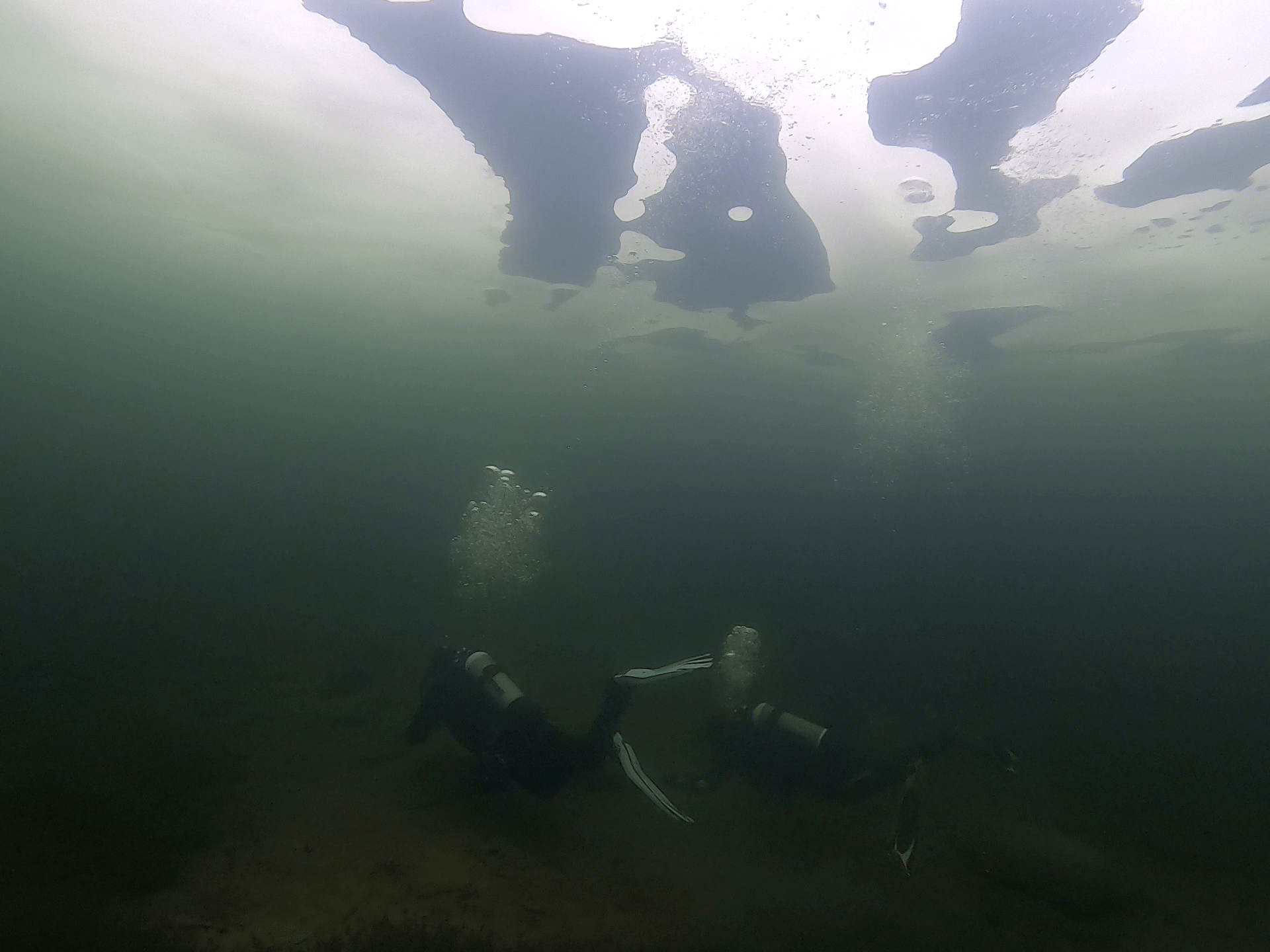Practical PADI ICE diving in Latvia is a series of descriptions of ice diving training in four parts - Here is First part, The second part, The third part and in Part Four.
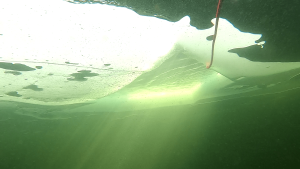
Table of Contents
Starting training to get your PADI ICE DIVER certification
Diving into the freezing conditions of ice diving is an exciting prospect, but safety and knowledge are paramount. "PADI ICE Diver” certification serves as a key to accessing the frozen world, providing divers with the skills and knowledge they need to explore safely. Let's begin training to start earning your PADI ICE diving certification.
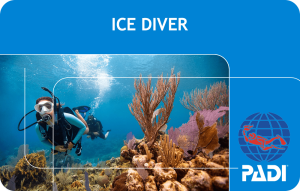
Prerequisites for obtaining the "PADI ICE Diver".
Before diving into ice diving, it's important to meet the PADI ICE Diving certification prerequisites. The certification is an advanced course that requires participants to have a “PADI Open Water Diver” certification or equivalent. This basic certification provides a thorough understanding of the fundamentals of diving, including buoyancy control, dive planning and emergency procedures.
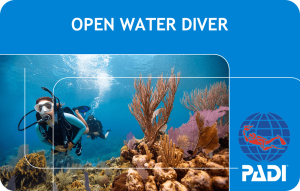
Although prior cold water diving experience is not required, a strong interest in exploring cold environments is highly recommended. Physical fitness is very important as the challenges of ice diving require a certain level of endurance and ability to adapt to the cold. A medical examination may be required before enrolling in a PADI ICE diving course to ensure participants are fit for the challenges of the waters of the sub-ice world.
Overview of the certification process
The PADI ICE Diver certification process is designed to equip divers with the specialized knowledge and skills necessary for safe and enjoyable cold water exploration. The course usually consists of theoretical training, closed water sessions and open water diving. Participants of sub-ice courses can expect:
- Classroom sessions– Theoretical components cover topics such as the unique challenges of ice diving, thermal protection considerations, cold water emergency procedures, and understanding the cold water environment.
- Confined water training– practical sessions in controlled environments such as swimming pools or closed sections of open water focus on skills such as buoyancy control, emergency ascents and use of equipment in cold conditions.
- Open water diving– the culmination of the certification involves applying the skills learned in real-world scenarios. Divers embark on a series of open water dives, often ice dives in specific locations where they navigate icy landscapes and face the unique challenges of cold water.
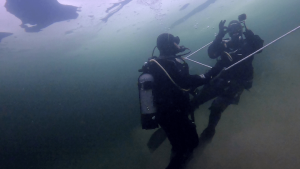
Successful PADI ICE Diving certification demonstrates a diver's competence to withstand the unique demands of the cold water environment, creating the foundation for a lifetime of safe and enjoyable ice diving adventures.
The importance of cold water specialization
While traditional diving certifications provide a solid foundation, specializing in cold water environments is critical for anyone looking to explore beneath the ice. The cold water specialization offered by the PADI ICE Diver certification delves into the nuances of sub-ice diving.
Understanding the effects of cold water on the body, learning thermal protection techniques and being able to respond to cold water emergencies are integral aspects of cold water specialization. Certification not only improves safety, but also ensures that divers can fully appreciate and enjoy the unique experience that ice diving offers.
Continuing to explore the practicality of ICE Diving in Latvia, the PADI ICE Diving certificate becomes a decisive starting point, opening the door to a world of frozen wonders. Follow the news to get more insight into the equipment, safety measures and techniques that will make your ICE Diving trip in Latvia both exciting and safe.
Essential equipment for ice diving in Latvia
Participating in an ICE Diving adventure in Latvia is not just diving into cold waters, but a carefully planned training with elements. When preparing for this underwater world, the most important thing is to equip yourself with the right diving equipment. In this part, we explore the most essential diving equipment that ensures safety, comfort and provides an exciting diving experience under the icy surfaces of Latvian lakes and rivers.
Recommendations for equipment needed for cold water diving
Drysuit: The cornerstone of ice diving equipment, the drysuit provides an impermeable barrier against cold water. Unlike wetsuits, dry suits allow the diver to dry off by completely expelling the water. Choose a loose-fitting dry suit that allows for easy movement and features high-quality seals at the wrists and neck.
- Underwear or thermals: Layering is key to keeping your body warm in cold environments. Invest in quality thermals to wear under your dry suit. These insulating layers trap and retain heat, preventing heat loss while diving.
- Winter Dive Regulator: Conventional scuba regulators can be prone to freezing in very cold water. Choose a regulator specifically designed for ice diving, with cold water seals and insulation to prevent freezing.
- Dive computer: Make sure your dive computer is suitable for cold water conditions and has features such as thermal insulation and frost resistance. A reliable dive computer is essential for monitoring dive time, depth and decompression limits.
- Ice diving fins: Choose fins designed for cold water use based on factors such as stiffness, blade shape and material. Cold water fins are optimized for efficiency and maneuverability in icy conditions.
- Thermal socks and boots: Keep your feet warm with thermal socks and boots designed for diving in cold water. Proper insulation around the feet is critical to maintaining overall body warmth.
Proper thermal protection: dry suits, hoods and gloves
- Drysuit: In addition to providing a dry environment, drysuits offer thermal insulation. Choose a dry suit made from high-quality materials that balance flexibility and insulation for comfort during long dives.
- Hoods: A significant amount of body heat is lost through the head, so a hood is essential for diving in cold water. Choose a hood that tightly covers your head and neck, preventing water from entering and keeping you warm.
- Gloves: Cold water gloves are essential to maintain dexterity and protect your hands from the biting cold. Choose gloves made from thick, insulating materials that still allow you to manipulate equipment effectively.
The importance of well-maintained equipment in cold conditions
Properly maintained equipment is important in ice diving. Cold weather conditions can contribute to equipment freezing problems, causing discomfort and potentially compromising safety. Here's why careful equipment maintenance is so important:
- Freezing Prevention: Cold water increases the risk of freezing, especially in regulator systems and other moving parts. Do regular maintenance and check your equipment to ensure it still works in sub-zero temperatures.
- Providing sealing and insulation: Leaks or damaged seals in drysuits can allow water to enter, defeating the purpose of thermal protection. Regularly check and, if necessary, replace the gaskets, as well as ensure the integrity of the insulation layers.
- Emergency Reliability: In the event of an emergency, your equipment needs to function perfectly. Regular maintenance improves the reliability of your equipment, giving you peace of mind on every dive.
- When preparing to explore the underwater wonders of Latvia's icy landscapes, investing in top-quality, well-maintained equipment is your ticket to safe and enjoyable ice diving. Stay tuned for the latest information on safety precautions, techniques and dive site recommendations as we continue our journey into the practical side of ice diving in Latvia.
Safety precautions and considerations
Participating in an ice diving adventure in Latvia is not just an exploration – it is an activity with cold, demanding elements that define the underwater world. In this segment, we delve into critical safety precautions and considerations that every aspiring ICE Diver should follow to ensure a safe and enjoyable experience beneath the ice surfaces.
Understanding the challenges of cold water diving
Temperature Management: A major challenge in cold water diving is managing the body's response to cold conditions. Exposure to cold water can cause hypothermia, which affects cognitive function and motor skills. Proper insulation, layered clothing, and listening to your body's signals are critical to reducing this risk.
Buoyancy Control: Cold water affects buoyancy, which can cause unexpected ascents or descents. Divers must learn buoyancy control techniques specific to cold water conditions in order to navigate underwater landscapes safely.
Limited Visibility: Ice particles, suspended sediments and reduced light transmission contribute to limited visibility in cold water environments. To improve safety, divers should know how to use their underwater lights and stay close to their dive buddies.
Emergency procedures unique to ice diving
Surface ice removal techniques– Knowing how to safely exit the water through surface ice is an essential skill for ICE divers. Techniques may include using an ice pick or carefully breaking away surface ice while maintaining control and awareness.
Dry suit failure protocols– In the event of a dry suit failure, divers must be prepared to effectively manage water entry. This may include using alternative buoyancy control devices and signaling for help from dive buddies.
Rescue procedures in cold water– Cold water emergencies require specialized rescue methods. Divers must be trained in how to help other divers with cold water-related problems, including hypothermia and equipment malfunctions.
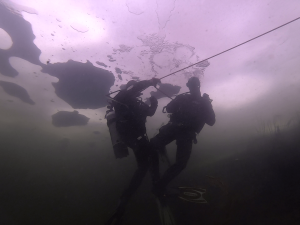
The importance of a careful dive plan
Site familiarization - Before going under the ice, divers should thoroughly familiarize themselves with the dive site. Understanding the underwater topography, entry and exit points, and potential hazards is critical to a safe and enjoyable experience.
Weather and ice conditions - weather conditions can significantly affect ice thickness and underwater visibility. Monitoring weather forecasts and ice conditions is essential to planning your dives and avoiding unexpected challenges.
Communication with dive buddies - effective communication with dive buddies is very important in a cold water environment. Communication is by rope or underwater communication equipment. Establishing clear signals and maintaining constant communication ensures that divers can respond quickly to changing conditions or emergencies.
Emergency Response Plan- A well-thought-out emergency response plan is non-negotiable for cold water diving. Divers should discuss and rehearse emergency procedures, including communication protocols and coordinated rescue efforts.
When it comes to ice diving, safety is not optional - it's a prerequisite for an enjoyable and incident-free experience. By understanding the unique challenges, learning emergency procedures and carefully planning each dive, enthusiasts can confidently discover the beauty of Latvia's icy waters. Stay tuned for more insight as we continue our journey into the practicalities of ICE Diving in this Baltic gem.
Learn more about ice diving
- Practical PADI ICE diving in Latvia 1/3
- Practical PADI ICE diving in Latvia 2/3
- Practical PADI ICE diving in Latvia 3/3
Followed by Soc. networks and learn about ice diving news
The New Year's tradition of the diving club "Daivings.lv" has been going on for 20 years and for the gathering of divers, diving under the ice takes place on December 31 at 10:00 In a dolomite quarry. Visitors to the diving school say that after such lessons, their sleep has also significantly improved, because being under water is a good way to separate yourself from the outside world for a while and relax your thoughts and mind.
Follow us on social networks and stay up to date with news, pictures and video content about our ice diving events.
- Facebook: facebook.com/diving
- Instagram: instagram.com/divingslv
- YouTube: youtube.com/c/DivingsLv
Join our diving community and give yourself the opportunity to immerse yourself in the exciting world under water!

Scuba diving club "Diving"
Pieneņi street, Mārupe district, Riga district
Phone for communication 220-77-202
Email: divingslv@gmail.com

